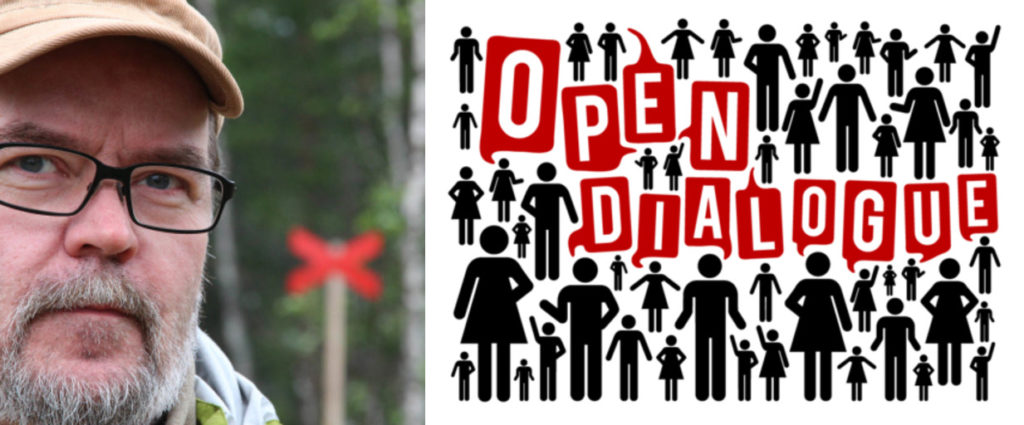In a new article, Finnish Psychiatrist Kari Valtanen, from Western Lapland Hospital District and the University of Jyväskylä, discussed his role as a psychiatrist in an Open Dialogue approach. Valtanen has extensive training in Open Dialogue, and he works in the Western Lapland Health Care District where he is immersed in an entire psychiatric system based in Open Dialogue principles and applications. In the article, he outlines how the psychiatrist is positioned within the seven values of Open Dialogue and explains why this positioning is vital when working with clients and families experiencing mental health stress or crises.
“Psychiatrists should be aware of their role as part of a team and avoid setting up a hierarchical position that can silence the dialogical and polyphonic culture of the team,” Valtanen writes. “To work dialogically and share responsibility over treatment processes, a democratic culture at the workplace is a prerequisite. The psychiatrist is in a pivotal role to establish and nurture this democratic atmosphere.”

The Open Dialogue approach is a family-oriented early intervention model developed in the 1980s in Western Lapland Finland. It sets itself apart from other methods in the way it “considers the client and their family as active participants rather than as objects of treatment in its planning and implementation with a psychotherapeutic focus.” The process involves a case-specific team where each member is oriented to dialogical practice.
Valtanen writes that dialogue promotes “new words, understandings, and opportunities” and creates space to “listen to everyone’s different voices and respond to them, and to learn unique contexts of each client’s utterances.”
In Open Dialogue, Valtanen explains, “supporting the individual and family’s agency from the beginning of the work is prioritized above the professional assessment of the situation or the diagnosis of the individual.” When professionals are too quick to make conclusions or interpretations of a client’s situation or decisions, it may lead to a reduction in the client, family, and network involvement.”
The seven principles that guide the Open Dialogue approach, derived from research programs and psychotherapy training, include immediate care, family and network orientation, responsibility, flexibility and mobility, psychological continuity, tolerance of uncertainty, and dialogue. Below, the author offers her observations of the relationship between these values and the role of the psychiatrist as a member of the team.
- There should be no need for a referral to access psychiatric treatment, although the psychiatrist is often not readily available to meet for the initial consultation due to the small number of psychiatrists. Immediate care is warranted in severe crisis. Otherwise, the other team members can listen and respond to family concerns and varying perspectives.
- Psychiatrists should have additional training in working with families and networks as opposed to the typical 1:1 setup, allowing them to collaborate with the team and contribute to dialogical conversations. Family and network orientation are considered a “key resource for understanding and supporting individuals in crises.”
- Responsibility lies in the team’s ability to “bring into consideration various important issues during the process…” The psychiatrist’s availability for consultations supports collaboration and generates a sense of safety.
- Flexibility is a critical feature in a need-adapted approach to treatment. Psychiatrists in this model participate in home visits and strive to make team meetings.
- Continuity involves tending to the therapeutic relationship between family and team. While the psychiatrist does not have time to work as closely as other team members regarding this part of the treatment process, their role can be to respect the process of the team and work not to disrupt it.
- “In order to restore the agency of the individual and network, it is important for a psychiatrist, along with the other team members, not to rush to treatment solutions or understanding others too promptly.” Tolerance of uncertainty is encouraged to help psychiatrists and other team members to slow down when in crisis to not risk overlooking the client’s own knowledge to alleviate the situation.
- The main goal of Open Dialogue is to create dialogism or dialogue between all team members involved. The psychiatrists can contribute to listening to all perspectives and offer their own understanding.
Because of psychiatrists’ position of power as medical professionals, Valtanen suggests a sense of awareness of potential influence when assessing individuals with such power differentials. “Substantial power is in use when people’s experiences of life are interpreted and defined by professionals,” he explains. Instead, professionals can commit to collaboration and a sharing of nuanced understandings, or ‘voices,’ open for ongoing review.
“What is crucial in treatment is to keep the clients and family members and their sense of agency at the center. The agency or the definitions of the professionals, including the psychiatrist, are not so essential.”
Ultimately, Valtanen underscores the hope that concerns of the client and family are prioritized.
“The life experiences, social contexts, health issues, and so on of each human being are unique, multi-dimensional, and complex. It is important that people are listened to in their unique life situations and that clinicians do not try to understand too quickly. Understanding gradually and continually advances the need-adapted treatment process tailored specifically to the needs of the client and their network rather than to the diagnosis.”
****
Valtanen, K. (2019). The psychiatrist’s role in implementing open dialogue model of care. Australian and New Zealand Journal of Family Therapy. DOI: 10.1002/anzf.1382 (Link)















I think it’s enough to give medications for a long time and irradiate as little as possible
Report comment
Would have loved to have had access to something like this rather than me having to figure most of it out by myself… 🙁
Report comment
We should not support any facet of the Mental Health System, including Autism-Aspergers-Neurodiversity, Psychotherapy, Recovery.
And so we must oppose the Open Dialogue Model.
Report comment
i agree with PD. No doubt, Open Dialogue may prove less harmful, to some people, in some respects…
that’s not saying much. I think of it as applying the ‘harm reduction model’ to Mental Health, Inc. perhaps better in some respects, for some people…
not a viable long term solution. I also think this is dangerous, because one speaks of a “democratic atmosphere” in Mental Health, Inc., and…
that is not possible. It’d be like a Jewish Eucharist or an atheist mass. psychiatry -is- a human rights abuse, after all.
I do (obviously) think the distressed need “help.” “Help” often means…real healthcare, money, freedom, a voice. Real “help” scares the “helping professions…”
because they’re really just in existence to “help” the powers that be. 🙂
Report comment
I’m inclined to agree. Any type of control in “Mental Health” is open to exploitation and abuse.
When I engaged in my own psychotherapy I was at least an equal member, and the trainee counsellors were not interested in diagnosis.
I had suffered from a type of anxiety that I had never experienced before – when I withdrew from “medication” “suitable” for “schizophrenia”. My anxiety levels are now very much reduced.
I recovered through my own direction, with good “psychotherapeutic” support.
Report comment
I would really love to see the Open dialogue approach adapted to suit the response to children and families in crisis. So many children end up in psychiatric care and/or protective custody due to trauma/poverty/family dynamics, and yet the focus is almost always on treating the child in isolation from its distressing environment as if the child were the problem and not the environment. This damages children, it damages families when siblings and parents resent the distressed child’s needs, and it costs so much over the child’s lifetime in terms of recovering from such treatments and targeting. I don’t believe the current approaches to “trauma-informed” care in schools and community settings are adequate or correctly oriented toward helping families.
“In Open Dialogue, Valtanen explains, “supporting the individual and family’s agency from the beginning of the work is prioritized above the professional assessment of the situation or the diagnosis of the individual.” When professionals are too quick to make conclusions or interpretations of a client’s situation or decisions, it may lead to a reduction in the client, family, and network involvement.””
This is precisely the direction that CPS, schools and community settings need to be moving in. Help families and you’ll help kids.
Report comment
However when all this trauma-inducing shit is built into the structure of capitalist society addressing it without recognizing the need for revolutionary change can inevitably produce only half-assed results.
Report comment
Interesting.
I’ve been curious and wary. Yet hopeful.
No longer. I saw an eloquent post on one mother’s experience. With not only
how a teenager ended up in psychiatry, how after one month of prozac it led
to a suicide attempt and how OD has her on injections.
THAT is the outcome of shrinks sticking icky hands into nice stuff.
I won’t post the mother’s letters on here.
Report comment